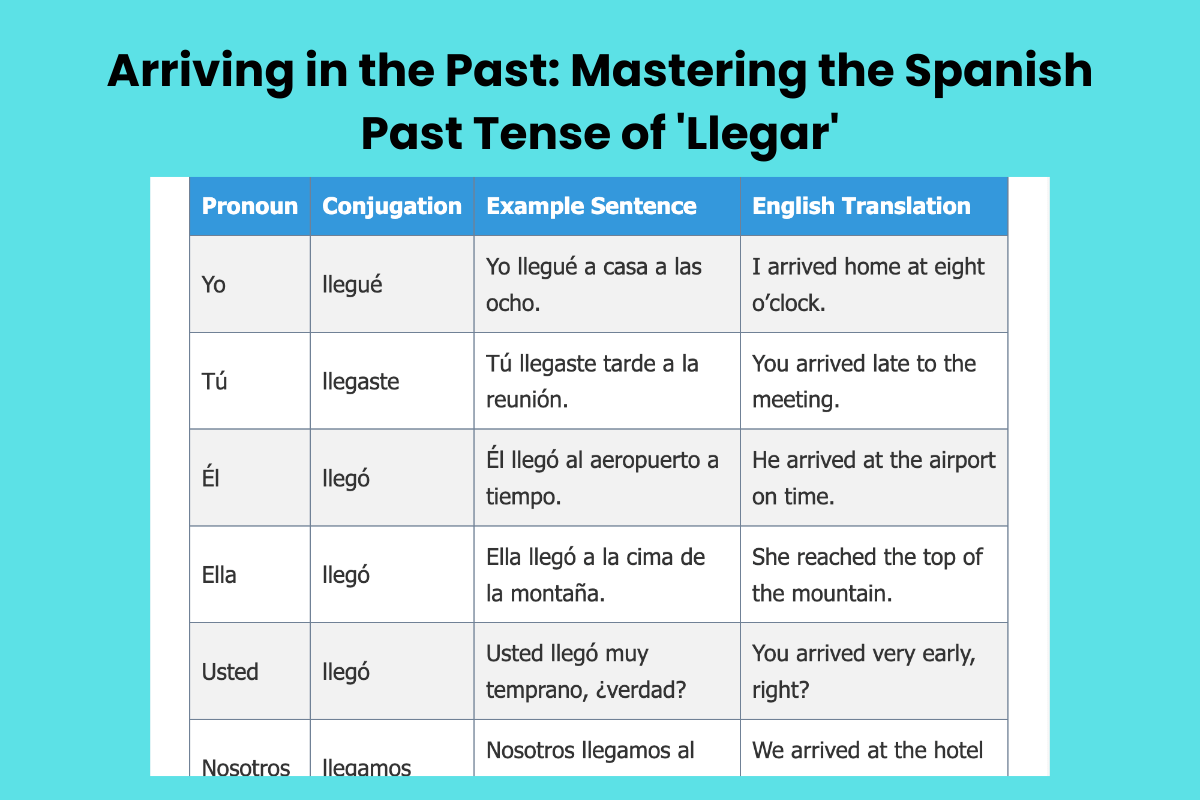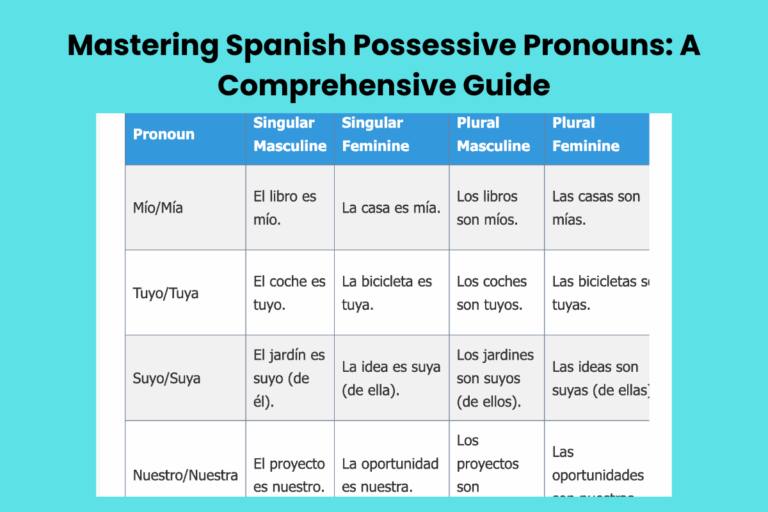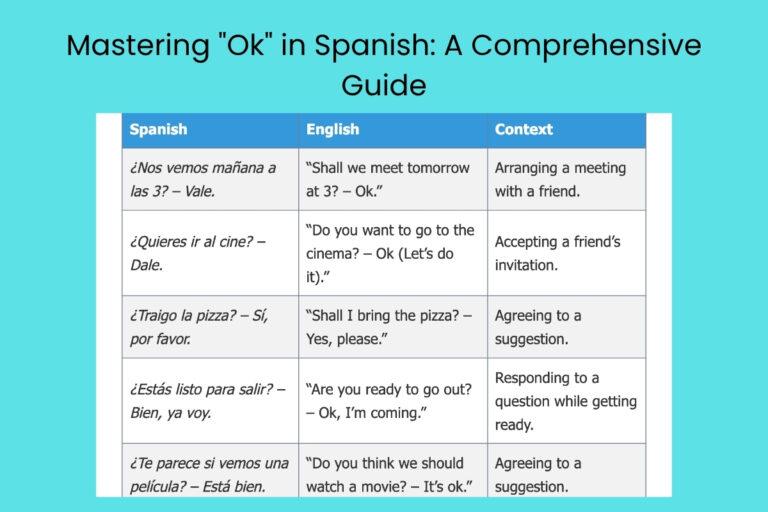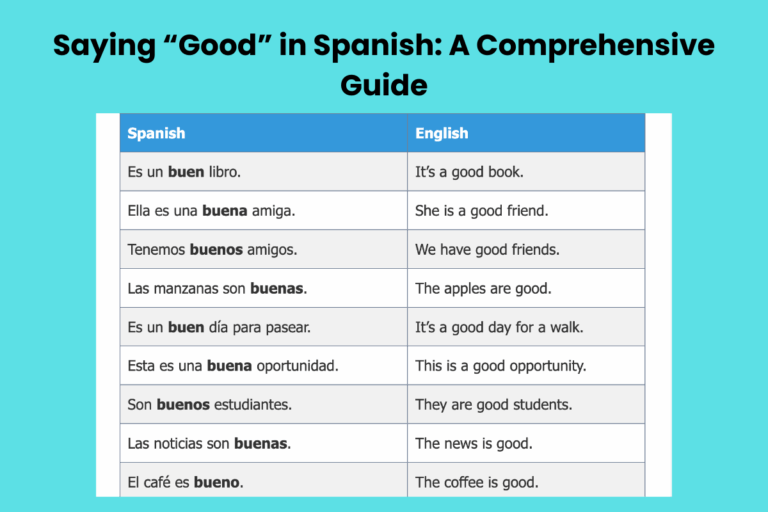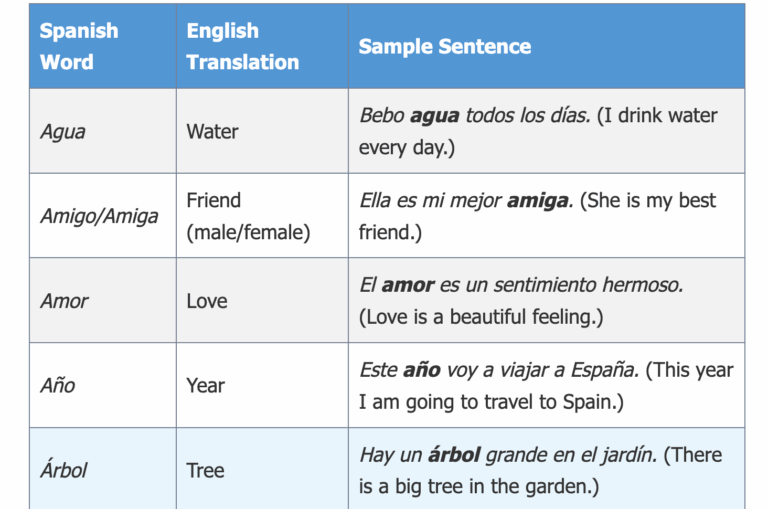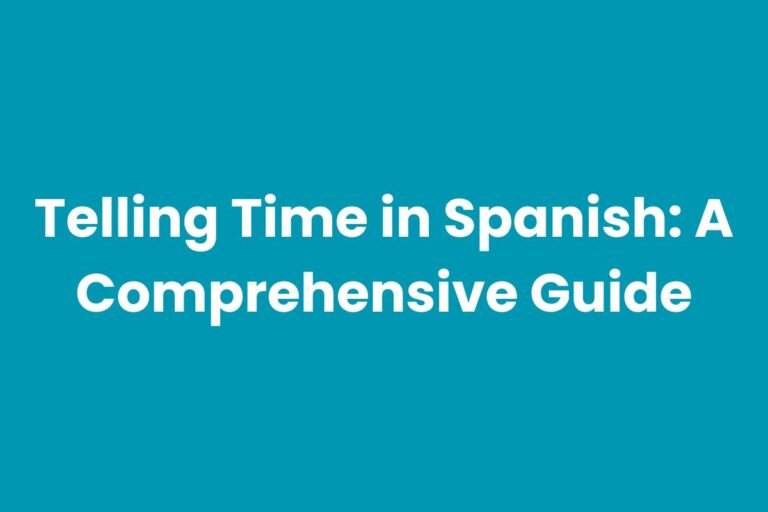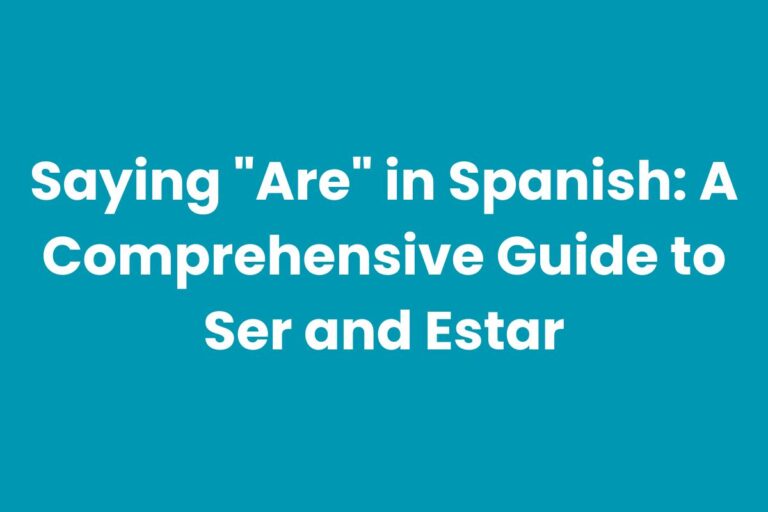Arriving in the Past: Mastering the Spanish Past Tense of ‘Llegar’
Understanding how to conjugate the verb “llegar” (to arrive) in various Spanish past tenses is crucial for narrating past events accurately and conveying nuances in meaning. Whether you’re describing a recent arrival or a long-ago event, mastering these tenses will enhance your fluency and precision.
This article offers a comprehensive guide to conjugating “llegar” in the Spanish past tense, covering the preterite, imperfect, and other past forms. This guide is perfect for Spanish learners of all levels, from beginners to advanced speakers, who want to improve their command of the past tenses and communicate more effectively in Spanish.
Table of Contents
- Introduction
- Definition of ‘Llegar’ and Past Tense
- Structural Breakdown of Spanish Past Tenses
- Types and Categories of Past Tenses for ‘Llegar’
- Examples of ‘Llegar’ in Past Tenses
- Usage Rules for Past Tenses of ‘Llegar’
- Common Mistakes with Past Tenses of ‘Llegar’
- Practice Exercises
- Advanced Topics: Nuances and Subtleties
- FAQ: Frequently Asked Questions
- Conclusion
Definition of ‘Llegar’ and Past Tense
The verb “llegar” in Spanish means “to arrive” or “to reach.” It’s a regular -ar verb, which simplifies conjugation to some extent. However, when conjugating in the preterite tense, it undergoes a spelling change to maintain its pronunciation.
Understanding the past tense is crucial because it allows you to talk about actions that have already happened. Spanish has several past tenses, each with its own specific use and connotation.
These past tenses enable you to describe completed actions, ongoing events in the past, and hypothetical past situations.
The primary past tenses we’ll focus on are the preterite, used for completed actions; the imperfect, used for ongoing or habitual actions in the past; and the past perfect (pluperfect), used for actions completed before another action in the past. We will also explore the conditional perfect to describe actions that would have happened in the past under certain conditions.
Structural Breakdown of Spanish Past Tenses
Spanish past tenses have specific structures that dictate how verbs are conjugated. Understanding these structures is essential for accurate usage.
Each tense uses different endings appended to the verb stem.
Preterite Tense Structure
The preterite tense is used for actions that were completed at a specific point in the past. For regular -ar verbs like “llegar,” the preterite endings are: -é, -aste, -ó, -amos, -asteis, -aron. However, “llegar” has a spelling change in the “yo” form to maintain the /ɡ/ sound: llegué.
The structure is as follows: Verb Stem + Preterite Ending. For “llegar”:
- Yo: llegué
- Tú: llegaste
- Él/Ella/Usted: llegó
- Nosotros: llegamos
- Vosotros: llegasteis
- Ellos/Ellas/Ustedes: llegaron
Imperfect Tense Structure
The imperfect tense is used to describe ongoing actions, habitual actions, or descriptions in the past. For regular -ar verbs like “llegar,” the imperfect endings are: -aba, -abas, -aba, -ábamos, -abais, -aban.
The structure is: Verb Stem + Imperfect Ending. For “llegar”:
- Yo: llegaba
- Tú: llegabas
- Él/Ella/Usted: llegaba
- Nosotros: llegábamos
- Vosotros: llegabais
- Ellos/Ellas/Ustedes: llegaban
Past Perfect (Pluperfect) Tense Structure
The past perfect tense, or pluperfect, is used to describe an action that had been completed before another action in the past. It is formed using the auxiliary verb “haber” in the imperfect tense plus the past participle of the main verb (in this case, “llegado”).
The structure is: Haber (Imperfect) + llegado
- Yo: había llegado
- Tú: habías llegado
- Él/Ella/Usted: había llegado
- Nosotros: habíamos llegado
- Vosotros: habíais llegado
- Ellos/Ellas/Ustedes: habían llegado
Types and Categories of Past Tenses for ‘Llegar’
Spanish offers several past tenses to express different nuances of time and action. Here’s a breakdown of the most common ones used with “llegar.”
Preterite (Pretérito Indefinido)
The preterite tense is used for completed actions in the past that have a definite beginning and end. It’s often used to narrate sequential events.
Example: Yo llegué tarde a la fiesta. (I arrived late to the party.)
Imperfect (Pretérito Imperfecto)
The imperfect tense is used for ongoing actions, habitual actions, or descriptions in the past. It provides background information and sets the scene.
Example: Siempre llegaba temprano a la escuela. (I always arrived early to school.)
Past Perfect (Pluperfect) (Pretérito Pluscuamperfecto)
The past perfect tense describes an action that had been completed before another action in the past. It’s used to establish a sequence of events where one action precedes another.
Example: Cuando llegué, ya había llegado Juan. (When I arrived, Juan had already arrived.)
Conditional Perfect (Condicional Compuesto)
The conditional perfect tense expresses what would have happened if a certain condition had been met in the past. It’s often used in hypothetical situations.
Example: Habría llegado a tiempo si no hubiera habido tráfico. (I would have arrived on time if there hadn’t been traffic.)
Examples of ‘Llegar’ in Past Tenses
Here are some examples illustrating the use of “llegar” in different past tenses. These examples will help you understand the context and nuances of each tense.
Preterite Examples
The following table provides examples of “llegar” conjugated in the preterite tense, showcasing its use in describing completed actions.
| Pronoun | Conjugation | Example Sentence | English Translation |
|---|---|---|---|
| Yo | llegué | Yo llegué a casa a las ocho. | I arrived home at eight o’clock. |
| Tú | llegaste | Tú llegaste tarde a la reunión. | You arrived late to the meeting. |
| Él | llegó | Él llegó al aeropuerto a tiempo. | He arrived at the airport on time. |
| Ella | llegó | Ella llegó a la cima de la montaña. | She reached the top of the mountain. |
| Usted | llegó | Usted llegó muy temprano, ¿verdad? | You arrived very early, right? |
| Nosotros | llegamos | Nosotros llegamos al hotel ayer. | We arrived at the hotel yesterday. |
| Vosotros | llegasteis | Vosotros llegasteis a la fiesta después de cenar. | You arrived at the party after dinner. |
| Ellos | llegaron | Ellos llegaron a un acuerdo. | They reached an agreement. |
| Ellas | llegaron | Ellas llegaron a la conclusión correcta. | They reached the correct conclusion. |
| Ustedes | llegaron | Ustedes llegaron a tiempo para el espectáculo. | You arrived on time for the show. |
| Yo | llegué | Ayer llegué a la oficina antes que nadie. | Yesterday I arrived at the office before anyone else. |
| Tú | llegaste | ¿Llegaste a ver la nueva película? | Did you get to see the new movie? |
| Él | llegó | El cartero llegó con un paquete para ti. | The mailman arrived with a package for you. |
| Ella | llegó | Ella llegó a ser una gran abogada. | She became a great lawyer. |
| Usted | llegó | Usted llegó a tiempo para la presentación, ¿cierto? | You arrived on time for the presentation, right? |
| Nosotros | llegamos | Finalmente, llegamos a nuestro destino. | Finally, we arrived at our destination. |
| Vosotros | llegasteis | ¿Llegasteis a entender el problema? | Did you manage to understand the problem? |
| Ellos | llegaron | Los refugiados llegaron a un lugar seguro. | The refugees arrived at a safe place. |
| Ellas | llegaron | Ellas llegaron a ser muy buenas amigas. | They became very good friends. |
| Ustedes | llegaron | Ustedes llegaron a conocer la verdad. | You came to know the truth. |
| Yo | llegué | Llegué a un punto en que no podía más. | I reached a point where I couldn’t take it anymore. |
| Tú | llegaste | Llegaste a ser muy importante para mí. | You became very important to me. |
| Él | llegó | Llegó a ser el mejor jugador del equipo. | He became the best player on the team. |
Imperfect Examples
The following table shows examples of “llegar” in the imperfect tense, illustrating its use in describing habitual or ongoing actions in the past.
| Pronoun | Conjugation | Example Sentence | English Translation |
|---|---|---|---|
| Yo | llegaba | Yo llegaba temprano al trabajo todos los días. | I used to arrive early to work every day. |
| Tú | llegabas | Tú siempre llegabas tarde a clase. | You always arrived late to class. |
| Él | llegaba | Él llegaba cansado después del trabajo. | He used to arrive tired after work. |
| Ella | llegaba | Ella llegaba con una sonrisa cada mañana. | She used to arrive with a smile every morning. |
| Usted | llegaba | Usted siempre llegaba puntualmente. | You always arrived punctually. |
| Nosotros | llegábamos | Nosotros llegábamos juntos a la escuela. | We used to arrive at school together. |
| Vosotros | llegabais | Vosotros llegabais antes que nosotros. | You used to arrive before us. |
| Ellos | llegaban | Ellos llegaban en autobús. | They used to arrive by bus. |
| Ellas | llegaban | Ellas llegaban siempre con regalos. | They always arrived with gifts. |
| Ustedes | llegaban | Ustedes llegaban sin avisar. | You used to arrive without warning. |
| Yo | llegaba | Cuando era niño, llegaba a casa y jugaba videojuegos. | When I was a child, I used to arrive home and play video games. |
| Tú | llegabas | Antes, tú llegabas siempre con ideas nuevas. | Before, you always used to arrive with new ideas. |
| Él | llegaba | Él llegaba a la oficina antes de que amaneciera. | He used to arrive at the office before dawn. |
| Ella | llegaba | Ella llegaba con la noticia de última hora. | She used to arrive with the breaking news. |
| Usted | llegaba | Usted llegaba a la reunión siempre preparado. | You used to arrive at the meeting always prepared. |
| Nosotros | llegábamos | Nosotros llegábamos a la playa al amanecer. | We used to arrive at the beach at sunrise. |
| Vosotros | llegabais | Vosotros llegabais a la estación justo a tiempo. | You used to arrive at the station just in time. |
| Ellos | llegaban | Ellos llegaban a la fiesta con mucha energía. | They used to arrive at the party with a lot of energy. |
| Ellas | llegaban | Ellas llegaban siempre con una solución. | They always arrived with a solution. |
| Ustedes | llegaban | Ustedes llegaban con todas las herramientas necesarias. | You used to arrive with all the necessary tools. |
| Yo | llegaba | Cada verano, llegaba el circo al pueblo. | Every summer, the circus used to arrive in town. |
| Tú | llegabas | ¿Llegabas a creer en los cuentos de hadas? | Did you use to believe in fairy tales? |
| Él | llegaba | Él llegaba a casa después de un largo viaje. | He used to arrive home after a long trip. |
Past Perfect Examples
The following table provides examples of “llegar” conjugated in the past perfect tense, illustrating its use in describing actions completed before another past action.
| Pronoun | Conjugation | Example Sentence | English Translation |
|---|---|---|---|
| Yo | había llegado | Ya había llegado cuando me llamaste. | I had already arrived when you called me. |
| Tú | habías llegado | Tú ya habías llegado antes de que empezara la película. | You had already arrived before the movie started. |
| Él | había llegado | Él ya había llegado a una conclusión. | He had already reached a conclusion. |
| Ella | había llegado | Ella ya había llegado a la cima cuando la encontramos. | She had already reached the summit when we found her. |
| Usted | había llegado | Usted ya había llegado cuando comenzó la reunión. | You had already arrived when the meeting started. |
| Nosotros | habíamos llegado | Nosotros ya habíamos llegado al hotel cuando empezó a llover. | We had already arrived at the hotel when it started to rain. |
| Vosotros | habíais llegado | Vosotros ya habíais llegado a un acuerdo. | You had already reached an agreement. |
| Ellos | habían llegado | Ellos ya habían llegado a la ciudad cuando los contactamos. | They had already arrived in the city when we contacted them. |
| Ellas | habían llegado | Ellas ya habían llegado a la meta. | They had already reached the goal. |
| Ustedes | habían llegado | Ustedes ya habían llegado cuando se apagaron las luces. | You had already arrived when the lights went out. |
| Yo | había llegado | Antes de que él saliera, yo ya había llegado. | Before he left, I had already arrived. |
| Tú | habías llegado | Para cuando llamé, tú ya habías llegado a casa. | By the time I called, you had already arrived home. |
| Él | había llegado | Cuando abrí la puerta, él ya había llegado y estaba esperándome. | When I opened the door, he had already arrived and was waiting for me. |
| Ella | había llegado | Antes de que terminara el día, ella ya había llegado a su destino. | Before the day ended, she had already arrived at her destination. |
| Usted | había llegado | Para cuando revisé el correo, usted ya había llegado a una decisión. | By the time I checked the mail, you had already arrived at a decision. |
| Nosotros | habíamos llegado | Antes de que comenzara la tormenta, nosotros ya habíamos llegado a un lugar seguro. | Before the storm started, we had already arrived at a safe place. |
| Vosotros | habíais llegado | Cuando llegamos al lugar, nos dimos cuenta de que vosotros ya habíais llegado. | When we arrived at the place, we realized that you had already arrived. |
| Ellos | habían llegado | Para cuando la policía llegó, los ladrones ya habían llegado y escapado. | By the time the police arrived, the thieves had already arrived and escaped. |
| Ellas | habían llegado | Antes de que pudiéramos saludarlas, ellas ya habían llegado a la mesa. | Before we could greet them, they had already arrived at the table. |
| Ustedes | habían llegado | Cuando entramos, nos dimos cuenta de que ustedes ya habían llegado a la fiesta. | When we entered, we realized that you had already arrived at the party. |
Conditional Perfect Examples
This table provides examples of “llegar” in the conditional perfect tense, illustrating hypothetical past situations.
| Pronoun | Conjugation | Example Sentence | English Translation |
|---|---|---|---|
| Yo | habría llegado | Yo habría llegado a tiempo si no hubiera perdido el autobús. | I would have arrived on time if I hadn’t missed the bus. |
| Tú | habrías llegado | Tú habrías llegado más rápido si hubieras tomado el tren. | You would have arrived faster if you had taken the train. |
| Él | habría llegado | Él habría llegado a la cima si no se hubiera cansado. | He would have arrived at the summit if he hadn’t gotten tired. |
| Ella | habría llegado | Ella habría llegado a la reunión si no hubiera tenido un imprevisto. | She would have arrived at the meeting if she hadn’t had an unexpected event. |
| Usted | habría llegado | Usted habría llegado a una solución si hubiera tenido más tiempo. | You would have arrived at a solution if you had had more time. |
| Nosotros | habríamos llegado | Nosotros habríamos llegado a la playa si no hubiera llovido. | We would have arrived at the beach if it hadn’t rained. |
| Vosotros | habríais llegado | Vosotros habríais llegado a un acuerdo si hubierais negociado más. | You would have arrived at an agreement if you had negotiated more. |
| Ellos | habrían llegado | Ellos habrían llegado a la meta si no se hubieran rendido. | They would have arrived at the goal if they hadn’t given up. |
| Ellas | habrían llegado | Ellas habrían llegado a la verdad si hubieran investigado más. | They would have arrived at the truth if they had investigated more. |
| Ustedes | habrían llegado | Ustedes habrían llegado a una conclusión si hubieran analizado los datos. | You would have arrived at a conclusion if you had analyzed the data. |
| Yo | habría llegado | Si hubiera sabido, habría llegado antes. | If I had known, I would have arrived earlier. |
| Tú | habrías llegado | Si hubieras corrido, habrías llegado a tiempo. | If you had run, you would have arrived on time. |
| Él | habría llegado | Si hubiera tomado el atajo, habría llegado primero. | If he had taken the shortcut, he would have arrived first. |
| Ella | habría llegado | Si hubiera tenido un mapa, habría llegado sin problemas. | If she had had a map, she would have arrived without problems. |
| Usted | habría llegado | Si hubiera seguido las instrucciones, habría llegado al destino. | If you had followed the instructions, you would have arrived at the destination. |
| Nosotros | habríamos llegado | Si hubiéramos salido antes, habríamos llegado a tiempo. | If we had left earlier, we would have arrived on time. |
| Vosotros | habríais llegado | Si hubierais preguntado, habríais llegado a la respuesta correcta. | If you had asked, you would have arrived at the correct answer. |
| Ellos | habrían llegado | Si hubieran tenido más recursos, habrían llegado a su objetivo. | If they had had more resources, they would have arrived at their goal. |
| Ellas | habrían llegado | Si hubieran trabajado juntas, habrían llegado a una solución. | If they had worked together, they would have arrived at a solution. |
| Ustedes | habrían llegado | Si hubieran escuchado el consejo, habrían llegado a un mejor resultado. | If you had listened to the advice, you would have arrived at a better result. |
Usage Rules for Past Tenses of ‘Llegar’
To use the past tenses of “llegar” correctly, it’s essential to understand the specific rules governing each tense. Here’s a breakdown:
Preterite Usage
Use the preterite tense to describe actions that:
- Were completed at a specific point in the past.
- Had a definite beginning and end.
- Narrate a sequence of events.
Example: Llegué a la estación y compré un billete. (I arrived at the station and bought a ticket.)
Imperfect Usage
Use the imperfect tense to describe actions that:
- Were ongoing in the past.
- Were habitual or repeated actions.
- Provide background information or set the scene.
- Describe characteristics or conditions in the past.
Example: Siempre llegaba temprano a la oficina porque me gustaba leer el periódico. (I always arrived early to the office because I liked to read the newspaper.)
Past Perfect Usage
Use the past perfect tense to describe actions that:
- Had been completed before another action in the past.
- Establish a sequence of events where one action precedes another.
Example: Cuando llegué al cine, la película ya había llegado a la mitad. (When I arrived at the cinema, the movie had already reached the middle.)
Conditional Perfect Usage
Use the conditional perfect tense to describe actions that:
- Would have happened if a certain condition had been met in the past.
- Express hypothetical past situations.
Example: Habría llegado a tiempo si no hubiera habido tanto tráfico. (I would have arrived on time if there hadn’t been so much traffic.)
Common Mistakes with Past Tenses of ‘Llegar’
Here are some common mistakes learners make when using the past tenses of “llegar,” along with corrections:
| Incorrect | Correct | Explanation |
|---|---|---|
| Yo lleguéaba tarde. | Yo llegaba tarde. | Mixing preterite and imperfect endings. The correct imperfect form is “llegaba.” |
| Yo he llegado ayer. | Yo llegué ayer. | Using the present perfect (“he llegado”) when the preterite is needed to indicate a completed action at a specific time. |
| Cuando llegué, Juan llegó antes. | Cuando llegué, Juan ya había llegado. | Using the preterite twice when the past perfect is required to show that Juan’s arrival preceded the speaker’s. |
| Habría llegado, pero no tuve tiempo. | Habría llegado, pero no tuve tiempo. | This sentence is already correct. It uses the conditional perfect to express a hypothetical past situation. |
| Llegé a la casa. | Llegué a la casa. | Forgetting the spelling change in the yo form. |
Practice Exercises
Test your knowledge with these practice exercises. Fill in the blanks with the correct past tense form of “llegar.”
Exercise 1: Preterite vs. Imperfect
Choose the correct form of “llegar” in either the preterite or imperfect tense to complete the following sentences.
| # | Sentence | Answer |
|---|---|---|
| 1 | Ayer, yo ________ a la fiesta a las diez. | llegué |
| 2 | Cuando era niño, siempre ________ tarde a la escuela. | llegaba |
| 3 | Nosotros ________ al aeropuerto justo a tiempo para el vuelo. | llegamos |
| 4 | Antes, ella ________ con una sonrisa cada mañana. | llegaba |
| 5 | ¿Tú ________ a entender el problema al final? | llegaste |
| 6 | Ellos ________ a un acuerdo después de largas negociaciones. | llegaron |
| 7 | Cada verano, el circo ________ al pueblo. | llegaba |
| 8 | Usted ________ a la reunión preparado, ¿verdad? | llegó |
| 9 | Vosotros ________ a la estación justo cuando el tren partía. | llegasteis |
| 10 | El cartero ________ con un paquete importante. | llegó |
Exercise 2: Past Perfect Tense
Use the past perfect
tense of “llegar” to complete the following sentences.
| # | Sentence | Answer |
|---|---|---|
| 1 | Cuando abrí la puerta, él ya ________. | había llegado |
| 2 | Antes de que comenzara la tormenta, nosotros ya ________ a un lugar seguro. | habíamos llegado |
| 3 | Para cuando llamé, tú ya ________ a casa. | habías llegado |
| 4 | Antes de que él saliera, yo ya ________. | había llegado |
| 5 | Cuando llegamos al lugar, nos dimos cuenta de que vosotros ya ________. | habíais llegado |
Conditional Perfect Tense
Use the conditional perfect tense of “llegar” to complete the following sentences.
| # | Sentence | Answer |
|---|---|---|
| 1 | Yo ________ a tiempo si no hubiera perdido el autobús. | habría llegado |
| 2 | Tú ________ más rápido si hubieras tomado el tren. | habrías llegado |
| 3 | Él ________ a la cima si no se hubiera cansado. | habría llegado |
| 4 | Nosotros ________ a la playa si no hubiera llovido. | habríamos llegado |
| 5 | Vosotros ________ a un acuerdo si hubierais negociado más. | habríais llegado |
Advanced Topics: Nuances and Subtleties
As you become more proficient, you’ll notice subtle nuances in how these tenses are used. For instance, the imperfect can also convey a sense of expectation or intention that was not fulfilled.
Example: Se suponía que llegaba a las cinco. (He was supposed to arrive at five.)
Here, the imperfect “llegaba” implies that the person did not, in fact, arrive at five.
Additionally, the choice between preterite and imperfect can dramatically change the meaning of a sentence.
Example:
- Llegué a la conclusión. (I reached the conclusion – completed action.)
- Llegaba a la conclusión. (I was reaching the conclusion/I used to reach the conclusion – ongoing or habitual action.)
FAQ: Frequently Asked Questions
Conclusion
Mastering the past tenses of “llegar” is an essential step in becoming fluent in Spanish. By understanding the structures, usage rules, and common mistakes associated with the preterite, imperfect, past perfect, and conditional perfect tenses, you can communicate more accurately and effectively about past events.
Practice regularly, pay attention to context, and don’t be afraid to make mistakes—they are a natural part of the learning process. With dedication and persistence, you’ll soon be narrating your own stories of arrivals and past experiences with confidence.

